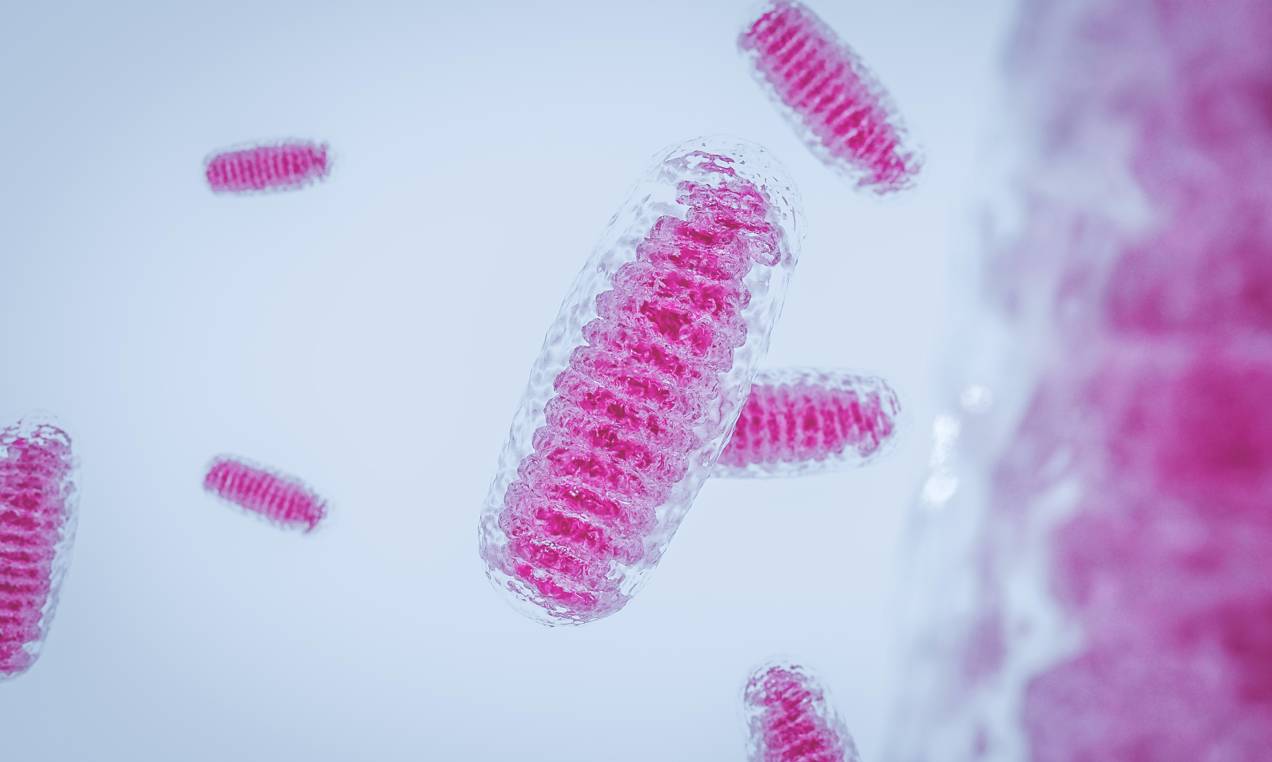
If you’re committed to improving your health, you’ve probably thought about how to slow down the aging process once or twice. And even though our lifespans have never been longer, it seems like science has focused more on how long you live over your quality of life. But that’s all changing.
Because of companies like Viome and researchers around the world, we’re learning more about the process of aging every day - including how to improve longevity and promote optimal health. It’s not just about fighting the physical signs of aging; it’s about resetting the internal clocks ticking in our cells. And at Viome, we’re uncovering real actionable ways you can alter your health to not just defy but even reverse the wear and tear of aging on your body.
As science has begun to unravel the mysteries of aging (down to your DNA), we’re finding it relies heavily on the internal mechanisms of your cells and mitochondria. Now, you too can hold the reins to the rate you age by focusing on your cellular integrity and resilience, and supporting your natural ability to stave off the aging process.
The first trick, however, is understanding ‘longevity’ and ‘aging’ - what each means, how they differ, and what you can do about it now.
What Exactly is Longevity?
Why do we care about longevity, and what makes it different from aging?
We all age. The physical signs may be more obvious to some than others - the crows feet inching at the eyes, sun spots that appear on the skin, and the greying of hair - but inside, your body is also experiencing a number of biological changes that can impact how early those external signs might show up.
Though we typically notice the physical signs first, the process of aging has begun long before you’ve noticed. Considering the ‘progressive, event-dependent decline in the ability to maintain biochemical/physiological function,’ aging begins once we’ve reached and surpassed the peak reproductive age (typically late teens and late 20’s for women, to around 30 for men).
Once this normal decline begins, you might be focused on your longevity - or the length of your life span independent of the biological aging process. So many individuals become fixated on a number, and not just any number. If you’re thinking, ‘I hope to live to be 100,’ you’re most likely considering your longevity. But, If you live to be 100 years old, your 100 may look very different from your neighbor’s 100. Your lifespan may be the same, but your quality of life - and the rate that your body ages - is a unique process from one person to the next.
Thus, it’s just as important to focus on the rate that we age and not just the age that you are. To truly encapsulate what it is to defy the process of aging, you must understand more about what happens in the body as you age.
Now with Viome’s Health Intelligence Test, we’re able to assess and score the key factors that determine the rate at which you age. By examining your cellular health, mitochondrial health, and determining your true biological , we can fit real actionable recommendations that don’t just help you promote a healthy gut - but actually start turning back the clock on your body’s odometer.
Cellular Health
Inside each cell, different sections of DNA are constantly being unwound, copied, and translated into specialized proteins. These proteins each have a specific job to help facilitate essential cell functions. It is in this way that our DNA is so important. Without it, a cell has no computer program to tell it how to heal, how to function, or how to replicate.
To keep it safe from degradation, each strand of DNA is capped to prevent it from fraying. Known as telomeres, the health of our DNA is dependent on them. If exposed, our DNA becomes more susceptible to mutations or even to being degraded itself. In many aging studies, chronic age-related conditions occur because the number of cells with damaged telomeres becomes all too prevalent. Although it’s natural for our telomere caps to get a little shorter as each cell ages, there are ways we can protect them. Depending on the health of your cells - and what is harming them - there are a number of nutrients that can help extend the shelf life of your telomeres and slow your cellular aging.
In your Cellular Health score, we examine the overall state and functional health of your human cells. It allows us to take a look at how well they handle stress and whether they need additional nutrient support. If oxidative stress shows up to be an issue in your health, you may find antioxidant recommendations right for you to help promote balance and neutrality in your cells. Your scores might also narrow down other supplements right for your diet to help optimize how well your cells are protecting your DNA.
Mitochondrial Health
To function, we require energy. Our body is able to take organic compounds from our food and convert them into chemical energy with the help of our mitochondria. It’s an incredible process - a process that may have been the evolutionary step necessary to drive single cell organisms to grow into much larger, more complex multi-celled organisms like us.
But there is a lot of stress associated with the level of energy our mitochondria generate for growth and recovery. As a byproduct, our mitochondria create a high level of free radicals that - if not neutralized - can develop into destructive oxidative stress (known to also harm our DNA and telomeres). In our Health Intelligence Test, we assess where your mitochondrial health stands by comparing the ability of your mitochondria to regenerate from stress, and how much energy they’re able to produce. These two combined scores allow us to make recommendations that can support the growing energy needs of your cells as they age. Without healthy, functioning mitochondria, your body faces an uphill battle to help old cells regenerate. But they do more than just that.
Your mitochondria don’t just produce energy - they can also signal if a cell is not operational. Rather than perpetuate a dysfunctional cell that can cause damage to surrounding tissue, your mitochondria can actually release signals that it’s time to let go. Known as apoptosis, it’s a necessary role to help weed out old, antiquated cells, and keep fresh, new ones coming in regularly.
Prevention Over Therapy
If you’ve heard the euphemism, ‘measure twice, cut once,’ you probably know how difficult fixing something can be compared to preventing it in the first place. It becomes even more difficult when we’re talking about overcoming challenging and often serious chronic conditions. When your cellular health and/or mitochondrial health is compromised, it requires immediate attention. If these issues go unchecked for too long, it can develop into any number of chronic diseases. Although you can still make changes to improve your health, adding clinical and medical therapeutics can make the process even more stressful.
But there are many conditions that can be prevented simply by supporting your body with the nutrients it needs to promote optimal functioning.
This is where your food can act as preventative medicine. The vitamins and minerals you take in - as well as the quality of the foods you consume - are vital to the recovery of your body. You don’t top off your Maserati with used tractor oil, and your body has more in common with a high-end luxury car than you might imagine - and just like you, it’s made to move. You shouldn’t be worried about how many miles you’re putting on it. Instead, treat your body with love, care, and identify the nutrients you need most. If we’re talking about cars, work with a specialized mechanic you know you can trust. But in the case of your diet, what your cells are lacking in, and how imbalanced your gut may be, look no further than Viome.
We examine and assess your health, decode and recalibrate your recommendations, and provide you an action plan tailored to your needs to help defy the processes of aging in you.
A GPS for precision nutrition throughout life
One of the greatest fallacies of nutrition is that we all need the same dietary requirements. Defying the one-size-fits-all approach to nutrition and understanding the dynamic requirements you personally face is one of the best ways to better improve your health. We are all different - why generalize the needs of one to fit the many? But this isn’t news to you, or at least it shouldn’t be. From the beginning, Viome has worked to help hundreds of thousands of people take control of their health and create a dietary plan that fits their needs, their body, and supports their gut microbiome.
But the second greatest fallacy of nutrition is - we all need the same dietary requirements no matter your age.
Our bodies undergo constant change. Our diets, environment, stress, and even relationships are constantly changing. And as we age - and our bodies are struggling to keep up with the necessary functions to maintain our cells running like new - we are bound to experience different nutritional needs. Although nutritional scientists working in the age-related chronic disease field are starting to understand that these changes are indeed occurring, there are still too few answers out there about how they’re changing.
But, scientists are starting to see some general themes: as we get older, our needs for protein increase, and our ability to digest foods change. Many age-related chronic conditions occur because of our ability to perform normal bodily functions - like digestion - become increasingly difficult. Without adapting our nutritional requirements to account for these biological changes, we may not be able to support the varying needs of our aging body.
That’s why re-testing regularly can provide you the personalized precision you need toward your diet. As your body changes with our recommendations, with time you’ll need adjustment. Re-testing at regular intervals allows us to keep your recommendations up-to-date and constantly work toward improving your scores.
It’s about seeing your body as a dynamic landscape. You’re bound to change. Part of aging is also about growth - personal, emotional, mental… Our potential for change is limitless. By adjusting your perspective to see yourself for the work of art in progress that you are, age becomes just another meaningless number. What matters is our ability to adapt and that requires an evolving strategy toward your health. Appreciate your dynamic fluctuations as time passes and take the time to revisit your health regularly. Even the most subtle variations in your food and supplement recommendations can make the most monumental improvements to your health, one bite at a time.
Find out more about how you can test your own Biological Age, with our breakthrough Health Intelligence Test!
The information on the Viome website is provided for informational purposes only and with the understanding that Viome is not engaged in rendering medical advice or recommendations. Viome provides this educational information to share the exciting developments being reported in the scientific literature about the human microbiome and your health. Viome products are not intended to diagnose, treat, or prevent any disease.
These statements have not been evaluated by the Food and Drug Administration. This product is not intended to diagnose, treat, cure, or prevent any disease.



